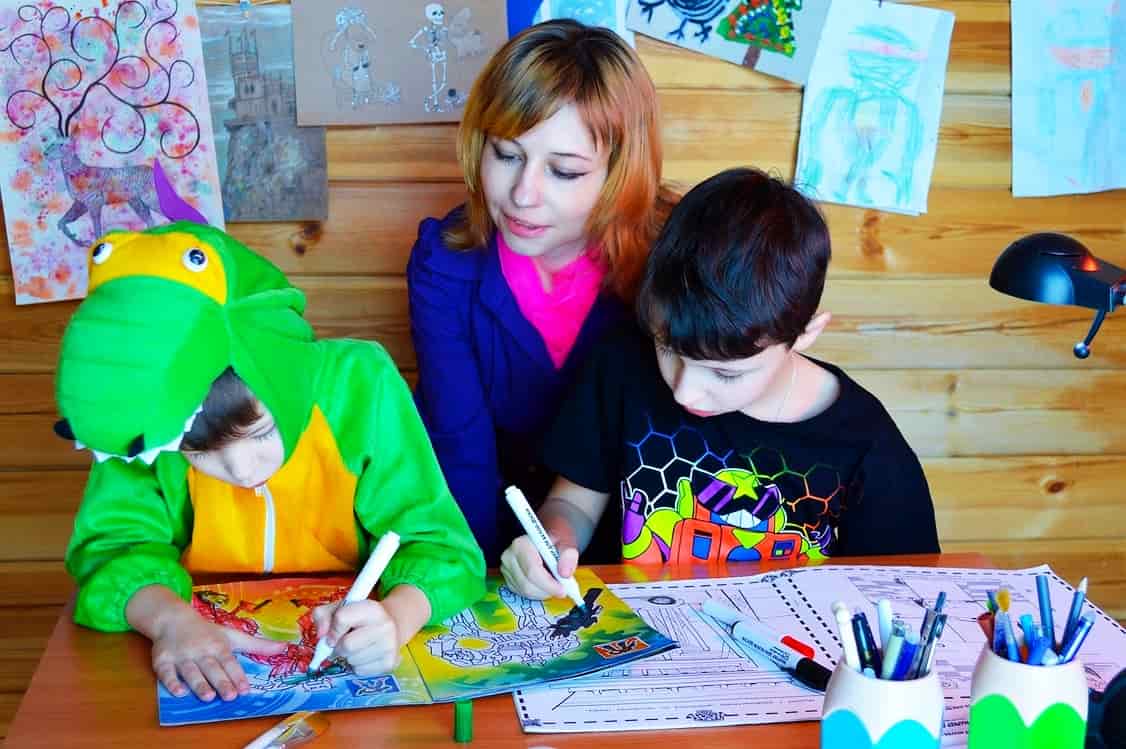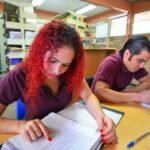Table of Contents:
- What Is Homeschooling?
- Things To Do When Starting Homeschool
- Advantages of Homeschooling
- Where to Find Free Homeschool Materials: Curricula, Lessons, Worksheets, Activities
- Additional Tips for Homeschooling Success
- Wrap-up
What Is Homeschooling?
Homeschooling is the education of children at home, typically by parents or guardians, rather than in a traditional public or private school system. There are many free homeschool educational and learning resources available online. Homeschooling is a viable choice for students of any grade level. Many families decide to homeschool their children for a variety of reasons.
If you’re thinking about homeschooling your child, you’re not alone. More and more families are choosing homeschooling as an alternative to traditional public or private schools. Homeschooled children consistently outperform their peers on standardized tests, and they’re more likely to graduate from college and lead successful careers. Homeschooled children and students have increased academic success; they consistently outperform their peers on standardized tests and are more likely to graduate from college.
Things To Do When Starting Homeschool
If you’re ready to start homeschooling or thinking about it, here’s what you need to know and do:
- Research your state’s homeschooling laws: Every state has its own laws regarding homeschooling, so it is important to research the requirements in your state. Some states require parents to notify the school district of their intent to homeschool, while others have more stringent requirements, such as requiring parents to have a certain level of education or to submit a portfolio of their child’s work to the school district each year.
- Choose a homeschooling curriculum: Many different homeschooling curricula are available, so it is important to choose one that is a good fit for your child’s learning style and interests. Some curricula are more traditional, while others are more hands-on or project-based. There are many free homeschooling curricula and educator resources available online — please see Where to Find Free Homeschool Materials below.
- Set up a learning space: You don’t need a dedicated homeschooling room, but you should create a space in your home where your child can focus on their studies. This space should be well-lit and have plenty of storage for books and supplies.
- Get organized: It is important to be organized when homeschooling. This means having a plan for what you will teach each day and keeping track of your child’s progress. There are many different homeschooling planners and resources available to help you stay organized.
- Gather your homeschooling resources: There are many different homeschooling resources available, including textbooks, workbooks, and online resources. You can also find homeschooling co-ops and other support groups in your area.
- Start teaching: The best way to learn how to homeschool is to just start doing it. You’ll figure things out as you go. And don’t worry, you don’t have to be a teacher to homeschool your child.
- Be patient and flexible: Homeschooling can be challenging at times, but it is also incredibly rewarding. It is important to be patient with yourself and your child and to be flexible enough to adapt your plans as needed. Also, strive to strike a balance between work, home, and homeschooling.
Advantages of Homeschooling
- Freedom to choose your child’s curriculum: You have the freedom to choose a curriculum that aligns with your values and beliefs, especially if you have reservations about public education.
- Individualized education: Homeschoolers can tailor their child’s education to their individual learning style and interests.
- Flexible schedule: Homeschoolers are not subject to the traditional school schedule. This means that they can take breaks when needed and learn at their own pace.
- Family togetherness: Homeschooling provides opportunities for you to spend more time with your child and bond with them over shared learning experiences.
- Religious freedom: Homeschoolers can teach their children about their religious beliefs in a way that is not possible in public schools.
- Safer environment: Homeschoolers are less likely to be victims of bullying and other forms of violence.
Where to Find Free Homeschool Materials: Curricula, Lessons, Worksheets, Activities
There are many great, free resources available for homeschoolers. Here are some of my favorites:
Multiple Subject Areas:
- BestEdLessons.org: Our website offers a plethora of freely available educational and learning resources for homeschooling your children.
- Openupresources Curricula: Free top-rated full-course curricula for K–8th grade math and K–high school language arts. (Free teacher resources are available upon by selecting homeschool on signup page.)
- Georgia Virtual Learning Shared Resources: Over 130 courses are available, ranging from elementary and middle school math, science, social studies, and language arts to numerous high school subjects. (Click on the Modules tab to access the free course lessons.)
- Khan Academy: Khan Academy is a non-profit organization that provides free, online education for anyone. They have a wide range of courses available, from math and science to history and the arts.
- Khan Academy Kids: Offers educational activities and games for young children in subjects like math, reading, and social-emotional development.
- Crash Course: Crash Course is a YouTube channel that offers free, high-quality educational videos on a variety of subjects. They have courses on everything from world history to chemistry. They also offer Crash Course for Kids.
- CoreKnowledge: The Core Knowledge Foundation provides open access to content-rich curriculum materials for preschool through grade 8.
- CK12.org: Free learning materials for all subject areas for kindergarten through 12th grade.
- FunBrain: Designed for kids from preschool to 8th grade, Funbrain offers a variety of educational games, videos and books in math, reading, grammar, science and history.
- Project Gutenberg: Project Gutenberg is a non-profit organization that provides free access to over 60,000 ebooks. You can find ebooks on a wide range of subjects, including classics, history, and science fiction. Here’s the list of their most viewed ebooks.
- OpenStax: OpenStax is a non-profit organization that publishes free, open-source textbooks. They have textbooks available for a variety of subjects, including math, science, and social studies. They also have higher level and college education content available.
- Unbounded Text Sets: Each expert pack provides a variety of options for students to have the most cohesive and progressive learning experience possible. They begin with simpler indicators and progress to more complicated levels, helping them become “experts” on the subject.
- UEN Resources for K-12 Education: A comprehensive online website of the K-12 education resources that Utah Education Network has developed for teachers and students. Here are their open textbooks.
- SchoolhouseRockTV: All school house rock videos from 1973 to 2009 are on this youtube channel, coverin math, grammar, science, America, and the earth.
- OERCommons K-12 Teaching and Learning: A public digital library of open educational resources for learning modules, lessons, assignments, assessments, and activities. Also, here are their curated collections and subject areas.
- PBS Learning Media: Free teaching resources including videos, lesson plans, and games aligned to state and national standards. PBS’s parent resources page offers hands-on activities and learning games. Also, here are their Math, Middle School Math, Science, and Arts topics pages.
- Educational Resources from Oregon State University: Free learning content includes a STEM curriculum, learning apps, and resources for all grade levels.
- SFUSD Learning Resources: Online and home learning resources for Pre-K through 12th grade.
- Education.com: Many free worksheets and activities for PreK through 5th grade, designed by educators.
- Greatskills Worksheets: 1,447 worksheets for pre-school to 5th grade for these topics: math, reading, science, word lists and writing.
- Better Lesson: High-achieving educators offer their lesson material in math, language arts, and science topics for pre-K to high school grades.
- Education World Lesson Plans: Lesson plans for teachers and students in many areas. Also, look at their comprehensive Worksheet Library.
- Share My Lesson: Thousands of free lessons, activities, worksheets, interactives, and more. Also, here are their top collections from the last several years.
- Teacher.org’s Lesson Plans: Lessons are divided into topics and grades. Each lesson has defined objectives, a breakdown of the resources required, and an in-depth procedure with an opening and a closing.
- Teachnology: Access well over 30,000 lesson plans from their extensive lesson collection.. They also have over 11,000 free printable K-12 worksheets.
- The Curriculum Corner: Find high-quality, free resources for homeschool and classroom teachers, designed to help teach preschool through sixth grade students.
- Free Lanuage Arts, Math, Science, and Social Studies Workbooks: Lots of workbooks in several subjects for all grade levels.
- Hand2mind: Provides over 1,000 downloadable and instructional printable worksheets based on teacher-made lessons covering literacy, math, science, stem, and social-emotional learning for K-5th grades.
- K5learning: Over 10,000 free arithmetic, reading, grammar and writing, vocabulary, spelling, and cursive writing worksheets are available with answer files, and registration is not needed.
- SERPInstitute: Here you will find hundreds of free, downloadable curriculum and lesson materials for middle-high school students, covering literacy, math, science, and social studies. Free registration is required.
- DiscoveryK12: For students in grades K–12, Discovery K12 provides a free online learning environment and curriculum.
- Seneca: Their Accelerated Learning Platform provides access to 104 free, interactive online courses for middle school, high school, and AP levels.
- PASS Textbooks: A series of supplementary curriculum packages designed to meet the needs of students with mild disabilities or other special learning needs for all major subjects. Also, Eric.ed.gov offers 24 Full PASS Texts and Teacher’s Guides.
- PBLWorks: A good collection of standards-aligned project ideas covering a variety of grade levels and topic areas.
- Public libraries: Find items in libraries near you. Public libraries have a wide variety of educational materials available for checkout, including books, audiobooks, DVDs, and online resources.
Math:
- Drfrostmaths Math Courses: Excellent online math courses from 1st grade through advanced algebra. They also provide downloadabe math learning resources.
- Embarc: Free, high-quality math curriculum lesson modules for grades K-8, based on the popular Eureka Math program. These include videos and answer keys.
- UnboundEd Math Curriculum: Browse or search their free K-12th grade math curriculum modules. All lesson materials can be downloaded, adapted, or shared.
- GeoGebra Math Resources: Freely available math materials for grades 4–8 covering algebra, geometry, number sense, measurement, operations, statistics, and probability. Here is their community resources page.
- Free Math Worksheets from Khan Academy: Over 100,000 free interactive practice math questions with check on answers. All levels are provided: pre-K through advanced calculus.
- Zearn: Learn math by interacting with pictures, using visualizations, and exploring real-world scenarios. (Free registration is required.)
- Coolmath4kids: Grades K–6 math lessons and fun activities, as well as quizzes and brain tests for kids, teachers, and parents.
- Mathematics Enhancement Programme (MEP): A whole curriculum of lesson modules with practice books, lesson plans, exercises, and solutions for kindergarten through high school. Here are their K-5th grade primary math resources.
- Kentucky Numeracy Project: 622 elementary math activities for K-4th grade, with filtering/sorting options.
- Comprehensive School Mathematics Program (CSMP): This math curriculum for K-6th grade was developed to be an exemplary curriculum by National Institute of Education for educators to emulate.
- NRich: A free collection of mathematical lessons, exercises, and problems meant to foster inquiring, intelligent, competent math students, from Cambridge University.
- Mathworksheets4kids: Printable math worksheets for K to high school covering all the key math topics like number sense, measurement, statistics, geometry, pre-algebra, and algebra.
- Math-Drills: More than 64,000 free math worksheets covering topics such as number sense, arithmetic, pre-algebra, algebra, geometry, measurement, money concepts, and numerous other subjects.
- IXL Math: Here are hundreds of preK–12th grade math lessons and activities to explore and learn from. They also offer math curriculum skill plans and textbooks.
- High School Math Curriculum from Openupresources: Open Up High School Math is a complete three-year high school curriculum built upon the Comprehensive Mathematics Instruction Framework to meet the expectations of College and Career Ready Standards. (Free teacher resources are available upon by selecting homeschool on signup page.)
- EngageNY Resources: Access free Mathematics Curriculum Modules for levels K through algebra 2 and precalculus.
- Math Learning Center: Their free resources for K through high school students include math apps, Discover Math at Home (by grade level), and curricular and lesson materials.
- MathGameTime: Math Game Time provides free math games, worksheets, homework help and videos for teachers, parents and students.
- National Library of Virtual Manipulatives: Online math visual activities and learning interactives for pre-K through high school.
- NCTM Classroom Resources: The National Council of Teachers of Mathematics offers many free math learning online lessons and resources for pre-K to high school.
- Illustrative Mathematics: Free pdf and online K-8 math curriculum courses along with Algebra 1, Geometry, Algebra 2.
- Math World: Free interactive math lessons for K through 6th grade.
- Open Textbooks from Siyavula: Free math and science textbooks for middle and high school students.
- Mathigon.org: Math puzzles, activities and lessons for all grades, along with more math activities and a middle and high school course library.
- Wolfram MathWorld: A comprehensive encyclopedia of mathematics with 13,000 detailed entries. It’s regularly updated, richly expressed, and provides interactive examples.
- MathPlanet: Take their secondary school math lessons in Pre-algebra, Algebra 1, Algebra 2, and Geometry. They also feature SAT/ACT practice tests.
Language Arts:
- Read Write Think: Collections feature curated sets of lesson plans and teaching materials on topics frequently taught in classrooms.
- ReadingVine: K-8 reading passages are available for free use in the classroom or at home. Select by category, grade, topic, and ability.
- Endless Phonics: Free decodable readers and activities for teaching kids how to read.
- Starfall: Focuses on teaching children to read with interactive activities and games.
- EngageNY Resources: Access free English Language Arts Curriculum Modules for grade levels pre-K through 12.
- UnboundEd Language Arts Curriculum: Browse or search their free K-12th grade language arts curriculum modules. All lesson materials can be downloaded, adapted, or shared.
- ReadWorks Unit and Alignments: ReadWorks is an edtech nonprofit organization that is committed to helping to solve America’s reading comprehension crisis.
- Teachercreatedmaterials.com: TCM offers over 300 free teacher-approved language arts resources that can be used at home, in person, or in hybrid learning environments.
- Free English Language Worksheets: Elementary, intermediate, and advanced worksheets, along with many worksheets from various grammar and activity books.
- Free Workbooks from Unsocialized.net: Spelling and vocabulary workbooks for grades 1-12, along with grammar tutorials, workbooks, games and activities and grades 1-6 reading, grammar and spelling workbooks.
- IXL Lanuage Arts: Here are hundreds of preK–12th grade English language arts lessons and activities to explore and learn from. They also offer language arts curriculum skill plans and textbooks.
- NeoK12: A great collection of educational videos, games, quizzes, and puzzles that kids will enjoy.
- K12 Reader: K12reader offers free printable worksheet activities for all major elements of language arts: spelling, reading skills, grammar, vocabulary, and composition, for K-12th grades.
- Secondary ELA/ENG Curriculum of SVVSD: Language arts and writing lessons, manuals, and materials for grades 6-12.
- K-8 Grade Language Arts Curriculum from Openupresources: Facilitates the acquisition of skills and knowledge by immersing students in interesting scientific and social studies themes. Also available are High School Literacy Curriculum and Bookworms K–5 Reading and Writing, along with their Bookworms K–5 beta version. (You may access their free teacher materials for all of these by choosing homeschool on the sign-up page.)
- Seneca Language Arts Courses: 66 free English and English Literature courses for middle – high school are offered here.
- Meddybemps: Offers story starters to help youngsters write creatively.
- MsEffie: After 40 years of teaching, Ms. Effie has compiled a collection of her favorite assignments. In addition, she gives us many useful Handouts and AP English and Literature materials.
- English Language Arts Worksheets: K-8th grade language arts worksheets covering grammar, vocabulary, figures of speech, reading, and writing.
- Grammar And Writing Workbooks: For grades 1-6.
- PBS English Language Arts: Find ELA materials for students of all grades that are in line with national standards.
Science:
- SciGen from Serpmedia.org: 24 free science curriculum units, each featuring from 13-41 activities.
- National Aeronautics and Space Administration (NASA): NASA offers a wide array of unique experiences for educators and students designed to engage K-12th graders. Here is NASA’s STEM Resources search page, their Space to Learn page, and STEM Activities from NASA’s Jet Propulsion Lab. They also offer NASA Kids’ Club for kids interested in science and space exploration.
- Complete Science Curriculum from HandsomeScienceTeacher: Complete science lesson modules for grades 4-8 from a former teacher of the year.
- Smithsonian Fun Stuff for Kids and Teens: Entertaining activities, games, and fun stuff to do online from the Smithsonian’s museums, research centers, and zoo. Also, here is the Smithsonian Learning Lab with their newest teaching collections for all subjects and their Science Lessons for Grades K–5.
- K12 Science: This is a collection of science lessons and activities through SERC websites aimed at the K-12 teacher community. Here is their high school earth science course.
- Science Bob: This website is full of science experiments and activities that kids can do at home.
- STEM K-12 Curriculum: K-12 curricula for educators and content for students, developed by Stanford researchers.
- STEM Lesson Plans for K-12: Oak Ridge Institute provides a wealth of STEM curricula and classroom resources to assist in developing in students thinking, reasoning, teamwork, investigative and creative skills.
- STEM Teaching Resources: The National Institutes of Health (NIH) institutes and centers offer these free K-12 STEM teaching and learning materials.
- OpenSciEd: Elementary through high school science curriculum that fosters engaged science learning it’s freely available to anyone.
- Ecosystem for Kids: Free, interactive science games, worksheets and multiple choice questions for grades 1-5, aligned with curriculum & science topics.
- Science Worksheets: Science worksheets for grades 1-7 covering topics such as living and non-living things, five senses, states of matter, parts of a plant and many more.
- ScratchJr: Introduces young children (ages 5-7) to programming and coding through interactive stories and games.
- Google CS First: A computer science curriculum for middle and high school that makes coding easy to teach and fun to learn.
- Code.org: Provides learning resources for computer science and programming, including Computer Science (CS) Fundamentals for K-5 and online courses and labs for middle and high school.
- ACS (Chemistry): Free elementary and middle school chemistry lessons and resources.
- Open Physics: The OpenPhys project contains mobile web pages with physics lessons.
- The Concord Consortium: Free and interactive STEM learning activities (Science, Technologym Engineering and Math).
- Open Textbooks from Siyavula: Free math and science textbooks for middle and high school students.
- National Geographic: You can search National Geographic’s educational resources to engage with live events, free maps, videos, interactives, and other resources. Here is their Kids page.
- National Park Service: Offers free educational materials online and in print. Here is their Learn and Explore page.
- EPA Educator Resources: The EPA, other federal agencies, and outside organizations have provided a variety of science and environmental lesson plans, activities, and ideas that you can find below.
- Center For Science Education: Curriculum units, activities, and lessons on weather and Earth system science.
- Ology: The science website for kids from the American Museum of Natural History. Also see their curriculum units, lessons, videos and games and interactives.
- PhET Online Simulations: A library of online simulations by grade level that students can play with and explore to investigate scientific and mathematical models.
History and Social Studies:
- Teachinghistory.org and Digital Historian: Freely available History teaching and learning materials.
- OER Project: Free social studies curricula and complete social studies courses aligned to state standards, all totally free.
- Social Studies Worksheets: Social studies worksheets, incorporating all the essential areas like history, civics and geography.
- iCivics.org: A civics curriculum with many units covering multiple topics for elementary, middle and high school grades. They also have a civics game page.
- Docs Teach History: The online tool for teaching with documents, from the National Archives.
- Gilderlehrman.org: 231 free history lessons and activities.
- History Teaching Institute: Free history lesson plans in many areas, including U.S. history, the Scientific Revolution, and European history.
- World History for All of Us: History curriculum grouped into three categories of instructional units: scale in time, geographical space, and subject matter of the topics to be explored.
- History-Social Science Project: Lessons, essays, and primary source sets for students, organized by grade level, from K to 12th grade, from the University of California.
- Edsitement Humanities Curricula: 55 humanities curriculum units along with 31 teacher guides and 556 lesson plans.
- National Archives Lesson Plans: These are lesson plans using primary source materials to teach and learn about U.S. history, government, and civics events.
- Investigating History: Provides midde school curricular units and materials for U.S. and world history.
- Honoring Tribal Legacies: A digital collection of teaching resources about Native Americans for use in elementary, intermediate, and secondary classrooms.
- Library of Congress: The Library of Congress offers classroom materials to help teachers and students use primary sources from the library’s vast digital collections. Here is their Resources for Family Engagement page.
- Saylor.org Online Courses: Saylor offers many free, self-paced courses in numerous subjects for high school and college level students.
- The Getty Curricula and Teaching Guides: The Getty Museum’s visual arts curriculum are interdisciplinary and cover a range of topics.
Additional resources for homeschooling families:
- Home School Legal Defense Association (HSLDA): HSLDA is a non-profit organization that provides legal support and advocacy for homeschooling families.
- National Home Education Research Institute (NHERI): NHERI is a non-profit organization that provides resources and support for homeschooling families.
- Homeschool.com: Homeschool help that’s welcoming, inspiring, and life-changing.
- Kindgom First Homeschooling: A wonderful and comprehesive linked list of free homeschooling educational resources.
Additional Tips for Homeschooling Success:
- Set clear expectations: Make sure your child knows what is expected of them each day and week.
- Create a positive learning environment: Make sure your child feels comfortable and supported in their learning environment.
- Be encouraging and supportive: Ensure your child understands you are committed to them and that you believe in them.
- Schedule pauses: To combat fatigue, it is important to take rest intervals throughout the day.
- Get involved in your homeschooling community: There are many homeschooling groups and co-ops that offer support and shared resources, such as libraries, textbooks, and equipment, to homeschooling families.
- Don’t be afraid to ask for help: If you’re struggling with something, don’t be afraid to ask for help from other homeschoolers, your child’s pediatrician, or a homeschooling consultant.
- Stay empathetic and patient: Learning requires patience along with time. Don’t be disheartened if your child doesn’t grasp something quickly.
- Make learning fun: Find ways to make learning fun and engaging for your child. This could include using games, puzzles, and hands-on activities.
Wrap-up
Keep in mind that you are not alone; homeschooling families have access to a wealth of resources. Homeschooling can be fun and beneficial for both parents and children. It allows you to customize your child’s education to their individual needs and interests, and it provides opportunities for you to bond with your child over shared learning experiences. If you’re considering homeschooling your child(ren), I encourage you to do your research and learn more about the benefits and challenges of homeschooling.
– love learning -your best ed lessons guide, Scott





Thank you for sharing!